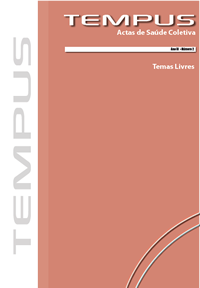Abstract
Even as a field of few publications, the rare disease begins to awaken the interest of some social groups of scientists seeking to understand the effects that civic associations generate in society. Specifically the subject and more consistently, it is in France that are the first proposals that seek to understand the work done by these associations. Joining some work of researchers in England, Portugal and the US, the prevailing view on the field of rare diseases has a European perspective. In contrast to this view, this work rescues the studies developed for master’s thesis to propose a perspective that goes beyond the apparent results of associations and find not only the motivations of militants as also the need for reconfiguration of thought on the field of rare diseases. This need for change is based on the market’s identification as the main coordinator of the field of rare diseases. Coordination try to deploy, in Latin America, the same primer imposed in the US and Europe for the sale of medicine under the guise of the sale of healing.References
Epstein S. Patient Groups and Health Movements. 2008. p. 500–41.
Nunes JA, Matias M, Filipe AM. As organizações de pacientes como atores emergentes no espaço da saúde: o caso de Portugal. Reciis [Internet]. 2007 Jun 28;1(1):107–10. Available from: http://www.reciis.cict.fiocruz.br/index.php/reciis/article/view/29/32
Rabeharisoa V. Experience, knowledge and empowerment: the increasing role of patient organizations in staging, weighting and circulating experience and knowledge. In: Akrick M, Nunes J, Paterson F, Rabeharisoa V, editors. The dynamics of patient organizations in Europe.Paris: Sociales, Collection Sciences; 2008. p. 13–34.
Rabeharisoa V, Callon M, Filipe AM, Nunes JA, Paterson F, Vergnaud F. The dynamics of causes and conditions : the rareness of diseases in French and Portuguese patients ’ organizations ’ engagement in João Arriscado Nunes Frédéric Vergnaud. Paris; 2012. Report No.: 026.30 Deve-se chamar a atenção para a grande variedade de trabalhos realizados na perspectiva dos estudos entre países diferentes, mas europeus, ou países diferentes e do “norte”. Muitas ações estão em andamento em países de todos os continentes, mas ainda sem grande interesse dos pesquisadores. Há o risco de, nos países da América Latina, o modelo europeu ser implantado na sua totalidade, sem considerar as características locais. Esse argumento é reforçado quando se percebe que as indústrias que investem nas associações, independentes do país, são, praticamente, as mesmas. A globalização da doença não pode superar a regionalização dos problemas.
Rabeharisoa V, Moreira T, Akrich M. Evidence-based activism: Patients’ organisations, users’ and activist’s groups in knowledge society. CSI Work Pap Ser. 2013;33.
Allsop J, Jones K, Baggott R. Health consumer groups in the UK: a new social movement? Sociol Heal Illn. 2004;26(6):737–56.
Filipe AM. Actores colectivos e os seus projectos para a saúde: o caso das associações de doentes em Portugal. eã [Internet]. 2009;1(2):1–48. Available from: www.ea-journal.com 8. Novas C. The Political Economy of Hope: Patients’ Organizations, Science and Biovalue.Biosocieties. 2006;1:289–305.
Callon M, Rabeharisoa V. Research “in the wild” and the shaping of new social identities. Technol Soc [Internet]. 2003 Apr [cited 2013 Dec 23];25(2):193–204. Available from: http://
linkinghub.elsevier.com/retrieve/pii/S0160791X03000216
Giddens A. Modernidade e Identidade. Rio de Janeiro: Jorge Sahar Ed; 2002.
Akrich M, Nunes JA, Rabeharisoa V. Conclusions. The Dynamic of patient organizations in Europe. 2008. p. 221–45.
Ginzburg C. Sinais - Raízes de um Paradigma Indiciário. Mitos, emblemas, sinais: Morfologia e Historia. São Paulo, SP: Companhia das Letras; 1989. p. 143–80.
Faurisson F. Problemática das doenças raras [Internet]. Paris: EURORDIS; 2000. Available from: http://www.EURORDIS.org/pt-pt/content/o-que-e-uma-doenca-rara
Santos B de S, Hespanha P. O Estado, a sociedade e as políticas sociais. Revista Crítica de Ciências Sociais. Coimbra, Portugal: Facudade de Economia da Universidade de Coimbra; 1987
Sep;62.
A Tempus garante critérios rigorosos, por meio de avaliação sistemática. Os autores se responsabilizam pela veracidade e ineditismo do trabalho cabendo a eles a cessão de direitos de publicação à revista. A confiabilidade dos conteúdos e a marca própria de apresentação tem como objetivo uma comunicação personalizada, adaptada aos padrões da revista, na medida em que adota critérios de excelência exigidos por seus usuários e especialistas, considerando os rigores da comunicação científica. Os autores devem especificar sua contribuição individual na concepção, delineamento, execução do trabalho, análise ou interpretação dos dados, redação e aprovação final do manuscrito. Incluir Fontes de financiamento e de apoio logístico das pesquisas. Ao final da submissão do artigo, os autores devem enviar uma declaração de cessão de direitos de publicação à Revista TEMPUS , assinada e no formato PDF (Portable Document Format ): Modelo da declaração de cessão de direitos.
